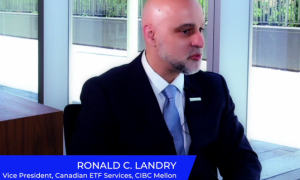by Franklin Templeton Investments blog, Franklin Templeton Investments
It was a tough week for global equities as trade wars dominated headlines. Stock markets in the United States, Europe and China and Japan all closed the week lower.
The Digest
Trump’s Testing Trade Talks

US-Chinese trade tensions proved to be the major market driver last week.
The week began badly for equities after US President Donald Trump signalled his intention to raise the tariffs rate on US$200 billion of Chinese imports to 25% from 10%.
This hike went ahead on Friday and over the weekend reports confirmed that Trump has also begun the process of imposing tariffs on a further US$300 billion of Chinese imports. On Monday this week, China retaliated, announcing that it would hike tariffs to 25% on US$60 billion of US goods, effective on June 1. This marks a ramp up in tensions, especially after Trump warned China against retaliation.
With this backdrop, investor sentiment was broadly risk-off last week. Cyclical equity sectors generally underperformed, while defensive sectors fared better.
In Europe, real estate was the best performing sector—and the only one to end the week in positive territory. Losses among stocks in the utilities sector were also more muted than other sectors. On the other hand, automobile stocks suffered the most, followed closely by banks, chemicals and basic resources stocks.
In early trading this week, markets sold off further.
The tensions have affected European and US markets, but emerging markets have borne much of the brunt. Emerging market currencies fell to their lowest levels since January in early trading on Monday this week. The Chinese offshore renminbi saw its worst one-day decline since August and made a new year-to-date low on Monday morning. Many commentators feel the spat has the potential to weigh more heavily on China than on the United States.
However, talks between the two sides have not entirely broken down and China has invited US trade representative Robert Lighthizer and Treasury Secretary Steven Mnuchin to Beijing to continue talks. Commentary from Trump’s top economic advisor Larry Kudlow that Chinese President Xi Jinping and Trump may meet at the G-20 summit in June does give some hope of a resolution. But this is all speculative and there’s plenty of time for both sides to change their stance.
This theme is likely to drive markets throughout the coming week.
Brexit: Back in the Spotlight
 While there was no real progress last week, Brexit really is back front and centre of political considerations in the United Kingdom.
While there was no real progress last week, Brexit really is back front and centre of political considerations in the United Kingdom.
The United Kingdom’s de facto deputy prime minister David Lidington confirmed last week that the country would be taking part in the European parliamentary elections. He added the UK government was now aiming to reach an agreement on the country’s future relationship with the European Union before parliament breaks for its summer recess in July.
Amid the lack of progress and increasing uncertainty about the political future of UK Prime Minister Theresa May, the pound weakened versus the US dollar.
This helped to mute some of the losses in the exporter-heavy FTSE 100 Index which fared better than its counterparts on the continent.
Now that the UK government has confirmed participation in European parliamentary elections at the end of the month, polling around these elections is now giving us a clearer indication of public sentiment around Brexit. Theresa May’s position looks increasingly precarious.
Several opinion polls paint a very unflattering picture of public sentiment towards May’s Conservative Party and growing support for the new Brexit Party.
May is consequently under increasing pressure from Conservative members of parliament (MPs) to give a timeline for her departure.
Meanwhile, cross-party talks continue to find a Brexit solution that could be acceptable to most MPs. We can expect a wealth of headlines throughout the week and will be keeping an eye on future opinion polls.
Last Week
Europe
European equities traded broadly lower last week, weighed down by concerns over global trade. A lack of progress around Brexit was not helpful in a week where risk-off sentiment took hold.
Away from trade and Brexit, Italy’s fiscal positioning came back into focus last week. The European Commission (EC) cut its estimate for Italian gross domestic product (GDP) growth in 2019 to 0.1% from 0.2% and also cut the 2020 estimate to 0.7% from 0.8%.
This means the estimated 2019 budget deficit would sit at 2.5% of GDP for 2019 and 3.5% of GDP in 2020. However, the EC and Italian government had previously agreed to a deficit target of 2.04% so these new figures could put the two sides on a collision course.
The Italian government criticised the EC report and insisted that it still needed to implement its promised tax cuts. Italian bond yields rose sharply on Tuesday into Wednesday.
In central bank news, with focus globally on dovish central bank releases, Sweden’s Riksbank surprised some commentators when its Deputy Governor Martin Floden suggested there was some possibility of an earlier-than-expected rate hike. Meanwhile, Norges Bank kept rates unchanged at 1%.
In macroeconomic data, German industrial production unexpectedly rose in March, while the country’s imports and exports also rebounded after falling in February.
Asia
Japan reopened after the six-day bank holiday for Golden Week, but closed the week down. The search for safe havens saw the Japanese yen strengthen versus the US dollar, which in turn weighed on Japanese exporters.
Korean equities declined as US-China trade issues weighed and tensions with North Korea escalated thanks to a fresh North Korean missile launch.
In Australia, equities were also weaker, but significantly outperformed the rest of the region. Mining stocks held up well in Australia last week, underpinning equity markets.
The Reserve Bank of Australia (RBA) voted to keep rates on hold at 1.5% which was a surprise, market expectations were for a cut to 1.25%.
Week Ahead
Economic Data
- In Europe we expect UK employment data on Tuesday; German and Eurozone GDP reports as well as eurozone employment on Wednesday; eurozone trade balance on Thursday; and eurozone car registrations and consumer price index (CPI) data on Friday.
- In the US, we expect: Import prices and small business optimism on Tuesday; retail sales and manufacturing survey on Wednesday; and housing starts on Thursday.
- In Asia & Pacific, we expect: Chinese industrial production, fixed-asset investment and retail sales on Wednesday.
Politics
- On Monday, the US is expected to release details of further 25% tariffs on $300 billion of Chinese imports if no progress in negotiations.
- Brexit negotiations continue through the week.
Monetary Policy
- US Federal Reserve (US Fed) speakers this week include Eric Rosengren, Richard Clarida, John Williams, Esther George and Thomas Barkin all speaking.
- The Bank of England’s Jonathan Haskel and Alex Brazier speak on Thursday and Friday respectively.
Views You Can Use
Insight from Our Investment Professionals
Fundamentals Drive Emerging Market Performances in April
Franklin Templeton’s Emerging Markets Equity team walks through events moving emerging markets in April and discusses the three things the team is thinking about today. The team believes the current market environment provides an attractive entry point for investors, particularly in the small-cap stock space. Read More.
Searching for Value When Growth Is King
It’s been a tough road for value investors during the past decade or so, even leading some pundits to declare the investing style is dead. The value-oriented Templeton Global Equity Group is digging in deep—and searching for deep values. While a growth-driven US market rally in the first quarter of this year presented a challenge, the team has uncovered some unloved stocks and sectors—particularly in Japan and Europe—where valuations appear reasonable and prospects good. Tony Docal, Dylan Ball and Joanne Wong take us on an around-the-world tour of where they are finding opportunities today. Read More.
European Elections: Big Changes, or Business as Usual?
Many observers are predicting that European elections later this month will usher a wave of populist representatives into the European Parliament. David Zahn, Head of European Fixed Income, Franklin Templeton Fixed Income Group, believes there may be a shift in political balance, but suggests the ability of extremists at either end of the political spectrum to dramatically alter the direction of the European Union is likely to be limited. Read More.
For timely investing tidbits, follow us on Twitter @FTI_Global and on LinkedIn.
Important Legal Information
This article reflects the analysis and opinions of Franklin Templeton’s European Trading Desk as of May 13, 2019, and may vary from the analysis and opinions of other investment teams, platforms, portfolio managers or strategies at Franklin Templeton Investments. Because market and economic conditions are often subject to rapid change, the analysis and opinions provided may change without notice. An assessment of a particular country, market, region, security, investment or strategy is not intended as an investment recommendation, nor does it constitute investment advice. Statements of fact are from sources considered reliable, but no representation or warranty is made as to their completeness or accuracy. This article does not provide a complete analysis of every material fact regarding any country, region, market, industry or security.
Nothing in this document may be relied upon as investment advice or an investment recommendation.
Data from third-party sources may have been used in the preparation of this material and Franklin Templeton Investments (“FTI”) has not independently verified, validated or audited such data. FTI accepts no liability whatsoever for any loss arising from use of this information and reliance upon the comments, opinions and analyses in the material is at the sole discretion of the user. Products, services and information may not be available in all jurisdictions and are offered by FTI affiliates and/or their distributors as local laws and regulations permit. Please consult your own professional adviser for further information on availability of products and services in your jurisdiction.
What Are the Risks?
All investments involve risk, including possible loss of principal. The value of investments can go down as well as up, and investors may not get back the full amount invested. Stock prices fluctuate, sometimes rapidly and dramatically, due to factors affecting individual companies, particular industries or sectors, or general market conditions. Bond prices generally move in the opposite direction of interest rates. Thus, as prices of bonds in an investment portfolio adjust to a rise in interest rates, the value of the portfolio may decline. Investments in foreign securities involve special risks including currency fluctuations, economic instability and political developments. Investments in developing markets involve heightened risks related to the same factors, in addition to those associated with their relatively small size and lesser liquidity.
Past performance is not an indicator or guarantee of future performance.
Links to External Sites
Franklin Templeton Investments is not responsible for the content of external websites.
The inclusion of a link to an external website should not be understood to be an endorsement of that website or the site’s owners (or their products/services).
Links can take you to third-party sites/media with information and services not reviewed or endorsed by us. We urge you to review the privacy, security, terms of use, and other policies of each site you visit as we have no control over, and assume no responsibility or liability for them.
______________________________
Copyright © Franklin Templeton Investments



















